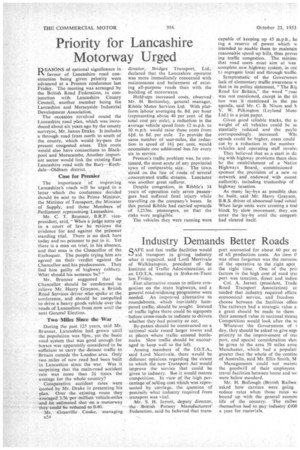Priority for Lancashire Motorway Urged
Page 58

If you've noticed an error in this article please click here to report it so we can fix it.
REASONS of national significance in favour of Lancashire road construction being given priority were advanced at a Preston conference last Friday. The meeting was arranged by the British Road Federation, in conjunction with Lancashire County Council, another member being the Lancashire and Merseyside Industrial Development Association.
The occasion revolved round the Lancashire road plan, which was introduced about six years ago by the county surveyor, Mr. James Drake. It includes a through road from north to south of the county, which would by-pass the present congested areas. This route would also have connections to Blackpool and Morecambe. Another important sector would link the existing East Lancashire road with the Bury—Rochdale—Oldham district.
Case for Premier •
The importance of improving Lancashire's roads will be urged in a letter which the conference decided should be sent to the Prime Minister, the Minister of Transport, the Minister of Supply, and those Members of Parliament representing Lancashire.
Mr. C. T. Brunner, B.R.F. vicepresident, said, " When a judge sums up in a court of law he reviews the evidence for and against the prisoner standing trial. There is no dock here today and no prisoner to put in it. Yet there is a man on trial, in his absence, and that man is the Chancellor of the Exchequer. The people trying him are agreed on their verdict against the Chancellor and his predecessors. They find him guilty of highway robbery. What should his sentence be?"
Mr. Brunner suggested that the Chancellor should be condemned to relieve Mr. Harry Grayson, a British Road Services driver who spoke at the conference, and should be compelled to drive a heavy goods vehicle over the roads of Lancashire from now until the next General Election.
Two Miles Since 'the War
During the past 125 years, said Mr. Brunner, Lancashire had grown until the population was 5+m., yet the basic road system that was good enough for horses was apparently considered to be sufficient to carry the densest traffic in Britain outside the London area. Only two miles of new road had been built in Lancashire since the war. Was it surprising that the main-road accident rate was more than 2+ times the average for the whole country?
Comparative accident rates were quoted by Mr. Drake in -presenting his plan. Over the existing route they averaged 3.56 per million vehicle-miles and be estimated that on a motorway -they could be reduced to 0.40.
Mr. Granville Cooke, managing 13-'4
director, Bridges Transport, Ltd., declared that the Lancashire operator was more immediately concerned with maintenance and betterment of existing all-purpose roads than with the building of motorways.
Hold-ups increased costs, observed' Mi. H. Bottomley, general manager, Ribble Motor Services Ltd. With platform labour averaging 6s. 8d. per hour (representing about 40 per cent. of the total cost per mile), a reduction in the average vehicle speed from 12 m.p.h. to 10 m.p.h. would raise these costs from 61d. to 8d. per mile. To provide the same number of seat-miles, the reduction in speed of 16i per cent. would necessitate one additional bus for every six in service.
Preston's traffic problem was, he continued, the most acute of any provincial town of comparable size. The town, stood on the line of route of 'several concentrated traffic streams. Lancaster, was another great sufferer.
Despite congestion, in Ribble's 34 years of operation only seven passengers had suffered fatal injury while travelling on the company's buses. In this period Ribble had carried upwards of 3,213m. passengers, so that the risks were negligible.
The vehicles they were running were capable of keeping up 45 m.p.h., he ing a reserve of power which v. intended to enable them to maintain reasonable speed up hills, thus prevel ing traffic congestion. The minimt that road users must aim at was complete new highway syste.ln, in ord t.) segregate local and through traffic.
Symptomatic of the Governmen lack of elementary traffic awareness v, that in its policy statement, "The Rig Road for Britain," the word "mac was not mentioned, except in the tit nor was it mentioned in the pal agenda, said Mr. C. B. Nixon and 14 V. W. Pilkington (Leyland Moto Ltd.) in a joint paper.
Given good reliable tracks, the ta weight of all vehicles could be su stantially reduced and the paylo correspondingly increased. Whc speeds could be higher, costs could cut by a reduction in the number vehicles and operating staff involvE They believed that as a start in de; ing with highway problems there shot be the establishment of a Natior Highways Board, commissioned sponsor the provision of a new ro network and endowed_ with essent authority, including trusteeship of highway taxation.
As many lay-bys as possible shot be built, said Mr. Harry Grayson, B.R.S. driver of abnormal-load vehicl When large units were creating a tral block by slow movement, they cot enter the lay-by until the congesti had cleared itself.




































































































